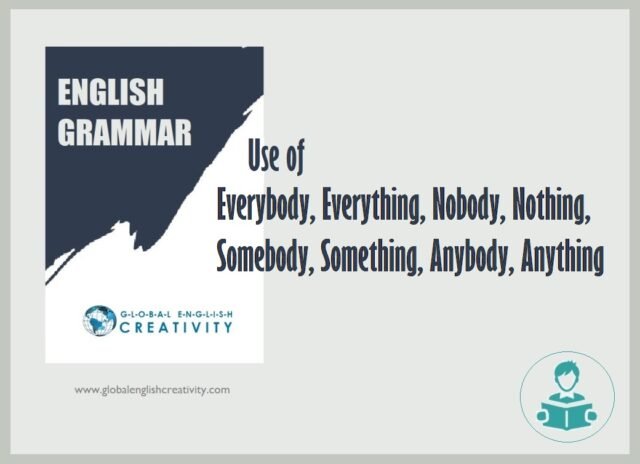Understanding Indefinite Pronouns:
Everybody, Everything,
Nobody, Nothing,
Somebody, Something,
Anybody, Anything
Indefinite pronouns are words that refer to nonspecific people, things, or amounts. Among these, pronouns like “everybody,” “everything,” “nobody,” “nothing,” “somebody,” “something,” “anybody,” and “anything” are commonly used to express general statements or to refer to unspecified entities. This article explores the use of these pronouns, providing examples and guidelines for their correct application.
1. Everybody / Everyone
“Everybody” and “everyone” are interchangeable and are used to refer to all people within a group. They are singular in form but imply a plural meaning.
Usage: “Everybody” is often used in informal contexts, while “everyone” is slightly more formal.
Example: “Everybody enjoyed the concert last night.”
2. Everything
“Everything” refers to all things or the entirety of something. It is singular and often used when discussing the totality of objects or matters.
Example: “Everything is ready for the party.”
3. Nobody / No One
“Nobody” and “no one” refer to the absence of people. Like “everybody,” they are singular but can imply a plural meaning.
Usage: “Nobody” is more informal; “no one” is more formal.
Example: “Nobody knows the answer to this question.”
4. Nothing
“Nothing” refers to the absence of things, indicating that none of a particular thing is present or true.
Example: “Nothing can change my mind.”
5. Somebody / Someone
“Somebody” and “someone” refer to an unspecified person. These pronouns are often used when the identity of the person is unknown or irrelevant.
Usage: Both terms are generally interchangeable, with “someone” being slightly more formal.
Example: “Somebody left their bag on the bus.”
6. Something
“Something” refers to an unspecified object, situation, or concept.
Example: “I need something to eat.”
7. Anybody / Anyone
“Anybody” and “anyone” are used to refer to any person in a general sense. They can be used in questions, negative statements, or to express uncertainty.
Usage: “Anybody” is more informal, while “anyone” is more formal.
Example: “Is anybody home?”
8. Anything
“Anything” refers to any object, idea, or situation. It is used to indicate a lack of specificity or restriction.
Example: “You can ask me anything.”
Key Points to Remember
- Singular Verb Agreement: Despite often implying more than one person or thing, these pronouns take singular verbs. For instance, “Everybody is here” (not “are here”).
- Formality: Some of these pronouns have more formal or informal counterparts. For example, “everybody” vs. “everyone” or “somebody” vs. “someone.”
- Contextual Usage: The choice between similar pronouns often depends on the context and level of formality.
These pronouns are essential in English for expressing generalizations and unspecified entities. By understanding their proper use, one can enhance both spoken and written communication skills.
also see:
| ONLINE GRAMMAR QUIZZES |
| ENGLISH GRAMMAR_1 |
| ENGLISH GRAMMAR_2 |
| GRAMMAR: SPOT THE ERROR |
| USEFUL EXPRESSIONS IN ENGLISH SPEAKING |
| WORD FORMATION PROCESSES |
| PHONETICS |







































